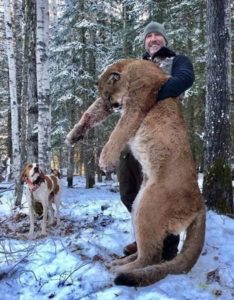
EDMONTON — Hunters have been killing cougars in Alberta for decades.
They often follow prints in the snow or use dogs to track the big cats before they are shot with guns or bows.
Last month, outdoor television host Steve Ecklund’s cougar hunt led to online threats and criticisms — including a penis comment from Laureen Harper, wife of former prime minister Stephen Harper — after he bragged about it on social media.
Similar outrage followed the killing of No. 148, a well-known Banff grizzly bear, by a hunter in British Columbia last summer.
Both kills were legal.
Scientists say a cultural divide still exists — even within their own community — about hunting large carnivores.
“It’s seeing a much greater value on an individual animal rather than a population, but the system is set up for us to manage populations, not individuals,” said Adam Ford, an assistant professor of biology at University of British Columbia Okanagan.
“You see this come up when the individual-focus conservation people see a dead cougar and call people out for having a small penis.
“The way hunting has been designed for a long time is to not have an impact on the population.”
Alberta has regulated its cougar population since 1969. An annual quota allows up to 155 animals to be hunted each year.
The province estimates there are 2,000 to 3,500 cougars.
Both the government’s top carnivore expert and University of Alberta biologist Mark Boyce have said it’s a sustainable population that must be managed because cougars can prey on cattle or become a public safety risk.
Similar debates have taken place around grizzly bears. The hunt in B.C. was banned last month after surveys showed it wasn’t supported by most residents.
Although people are concerned about “beautiful cuddly carnivores” being shot, Ford said he worries scientists have been weighing in on the ethical debate over hunting.
“My morals are different than yours, but facts should be facts,” he said, noting he’s working on a paper looking at the growing divide between scientists on issues such as hunting.
Hunters have defended the hunt as a tradition.
“As outdoor enthusiasts, we look for opportunities to get into the outdoors,” said Wayne Lowry, a hunter and past president of the Alberta Fish and Game Association. “The cougar season offers a very late-season hunting opportunity.”
Lowry, who killed a cougar near Crowsnest Pass about 15 years ago, said it’s unlike any hunt he’s experienced.
“It took me two years,” he said. “For me, it was a once-in-a-lifetime kind of event.
He still has the mounted cat in his home.
“It was a great experience … You see the dogs get excited and you get excited as well.”
Lowry admitted there’s a lot of controversy about hunting.
“The debate is the same regardless of who it is, where it happens and what the species is. You have people who don’t like it and people who do.”
One scientist said the outrage is not generally with hunting, but an ethical debate over killing large carnivores that can suffer. Chris Darimont, associate professor of geography at the University of Victoria, said hunting for sport makes people uncomfortable.
“They cannot accept the idea that people kill carnivores not to feed their families, but to feed their egos,” said Darimont, who is opposed to killing animals other than for food or protection.
Ecklund said in a social media post that he made a stir-fry from the cougar, although eating the meat isn’t required by law.
Darimont, who hunts one elk or deer a year for food, said it’s a “thin veil of deception” for hunters to say they’re eating the animals, because predator meat isn’t very tasty.
“Wildlife managers for decades have acknowledged that these (animals) are not killed for their meat, but for their trophy items.”
The cougar hunt in Alberta should be re-evaluated, Darimont suggested. Science shows there are risks in overharvesting, because it’s tough to count carnivores and get a clear picture of the population, he said.
“There’s lots of uncertainty. Managers can and do make mistakes, and then we are just starting to learn of the evolutionary and social costs of killing large carnivores.”
The Alberta government says it hasn’t received any calls to end the hunt since the cougar controversy hit.
The province did ban the grizzly bear hunt in 2006 due to concerns about a dwindling population — although recent increases in some areas have led to calls to allow it to return in Alberta.


